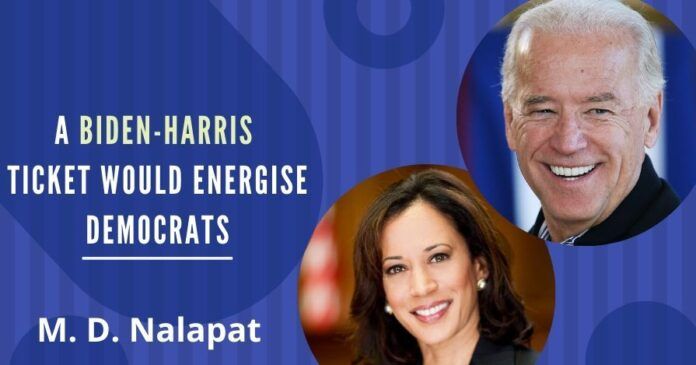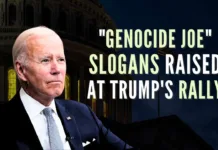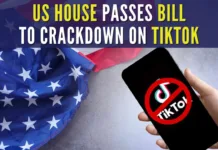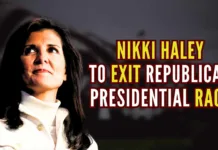
A Biden-Harris ticket would pose a grave challenge to President Donald Trump and Vice-President Mike Pence.
Just as national elections in India matter to US policymakers, elections there—especially to the US Presidency, the House of Representatives and the Senate—are important for India, a country that three Prime Ministers and three US Presidents in succession have brought together into what may be described as an alliance that dare not speak its name, for fear of inviting blowback from the historically reliably pro-Soviet Congress Party and the Communist parties within India. Some countries on the outside would also be uneasy at a coming together of New Delhi and Washington, these principally being Moscow, Islamabad and Beijing. The European Union(EU) would prefer a continuation of the present predisposition of several within the foreign policy establishment in India to prefer the EU to the US as the lead partner rather than lock onto the latter the way the Gulf Cooperation Council (GCC) and Japan have done.
In the past, it was Israel that developed what may be described as a “Closet closeness” with India. Even during the 1960s, a period when Yasser Arafat was both calling for the end of Israel as well as hugging Indira Gandhi in public whenever the opportunity arose, the canny Prime Minister who in 1971 detached Bangladesh from the clutches of Pakistan ensured that Moshe Dayan was a welcome guest in her inner circle. The Israeli hero of the 1967 war would land into a military aerodrome near Delhi and be brought by car at night to the capital, escorted by disciplined (and discreet) military officers. Such visits were for both his insights as to how to prevail in battle, as well as ensure access to the technologies used by Israel to ensure its security against what till the 1967 war was a formidable phalanx of foes. From that period onwards, despite multiple UN votes and countless official statements against the Jewish state, Israel has remained a reliable ally where the supply of critical equipment and insights are concerned.
The selection of Kamala Harris as his running mate by Biden would be an acknowledgement by the 74-year-old that he has truly imbibed the spirit of the revolution in politics (and in society) spearheaded by the rise to the Presidency of Barack Obama.
It took Prime Minister Narendra Modi to escape from the closet and visit Jerusalem to openly embrace Prime Minister Netanyahu in a fashion that his predecessors had lacked the courage to do. Even Prime Minister A.B. Vajpayee suffered from a phobia of admitting in public how closely linked Israel and India were in matters of security. When this columnist, together with The Jewish Institute for National Security of America (JINSA), organised the first-ever India-Israel-US trilateral in early 2003 at the India International Centre, New Delhi, strenuous efforts were made by the then “Executive PM” Brajesh Mishra to get the conference cancelled. Once that mission failed, his next move was to get cancelled all VVIP appointments made for the delegates from Israel and the US. It speaks for the character of Deputy PM L.K. Advani, Defence Minister George Fernandes and most notably President A.P.J. Abdul Kalam that each of them met the Trilateral Conference delegations “Informally” in their residences, to much gnashing of molars by individuals close to Vajpayee. National Security Advisor Mishra, on being told that the conference would not be cancelled, had warned darkly that the entire Muslim world would club India with the US and Israel as forming a gigantic—and mythical—“Hindu-Jewish-Christian” alliance against them. This columnist had—and continues to have— confidence that the Muslim community is as progressive and moderate as those belonging to any other faith in India, and the threatened blowback at the India-Israel-US trilateral failed to materialise. Indeed, among those who graciously hosted the US and Israeli delegations to dinner were filmmaker Muzaffar Ali at his farm and Nafees Fazal at the Viswa Yuvak Kendra. Ms Fazal, among the most senior lady politicians of the time, was then the Medical Education Minister of Karnataka.
In the US, Joe Biden is on course to be the Democratic Party nominee for the 2020 US Presidential election. His opponent Bernie Sanders made the cardinal error of following the example of Jeremy Corbyn and embracing not mainstream Muslims but the Wahhabi fringe, choosing a Pakistan-centric individual as his Chief of Staff. The main goal of this individual was to earn brownie points with General Headquarters (GHQ) Rawalpindi by getting Sanders to release one toxic statement after the other about India. An Erdogan acolyte, Representative Ilhan Omar, went around the country as the lead campaigner for Sanders, ensuring that Biden gained substantially over Sanders wherever Omar spoke. But although he may have once again failed to win the Democratic Party nomination, Senator Sanders genuinely cares about the poor. His very presence in the field has moved the Democratic Party away from the camouflaged elitism of the Clinton machine, which for long dominated the party machine and which is now prodding Biden to anoint Senator Amy Klobuchar as his running mate rather than the feisty Kamala Harris, who would better meet the needs and aspirations of voters who have long received the dirty end of the stick so far as the US economy is concerned. The selection of Kamala Harris as his running mate by Biden would be an acknowledgement by the 74-year-old that he has truly imbibed the spirit of the revolution in politics (and in society) spearheaded by the rise to the Presidency of Barack Obama.
A Biden-Harris ticket would pose a grave challenge to President Donald Trump and Vice-President Mike Pence. There has been talking that Trump may replace Pence with Nikki Haley, but this is unlikely. Vice-President Pence has shown his loyalty to a boss not easy to handle or to please and has demonstrated skills in administration which have helped the overall image of the Trump Presidency. Not just that, but Pence has deep links with the religious establishment in the US that would be essential for Trump’s victory in the November polls. What is more likely is that the charismatic Haley will be made Secretary of State should Trump prevail over Biden, and perhaps become the Vice-Presidential candidate in 2024, should Mike Pence run that year for the job that brought Trump to the White House.
The challenge before President Trump is less Biden than it is the economy. If economic stabilization does not take place by the middle of 2020 and the effects of Covid-19 on the economy not get shaken off by August, the Republican ticket will face headwinds across the slate board during the elections. Whoever wins in 2020, what is certain is that the US-India “Closet alliance” will continue and be strengthened. Both sides need each other to ensure that the two biggest democracies continue to lead in matters of both securities as well as the economy. US citizens who are more loyal to GHQ Rawalpindi than to American interests may not be happy about this, but the alliance of the world’s two biggest democracies is here to stay.
Note:
1. The views expressed here are those of the author and do not necessarily represent or reflect the views of PGurus.
- A Biden-Harris ticket would energise Democrats - March 24, 2020
- Warzones heat up as US-China conflict continues - November 25, 2019
- Modi 2.0 overcoming PC network’s sabotage of economy: Experts - October 14, 2019











The local politics in a relatively unknown city of Saint Paul, MN may have far-reaching, even global, consequences. On May 20, the passage of resolution 20-712, labeling India Islamophobic, is the beginning of a doomsday politics for shunning democracy, promoting community divide, and the waning support for the democratic party locally and nationally. Why?
Thousands of concerned Minnesotans of Indian origin were disenfranchised from expressing their views and facts to the CC and thus totally disrespecting democracy for which we stand for. How hypocritical and discriminatory of the CC that they invited a community activist in the virtual meeting on May 13 but denied us?
Many Minnesota Indians including me, the diehard democrats, were let down by local Democratic leaders who we have historically voted for. We are disappointed that the CC sold their conscience and/or succumbed to the influence of the Minnesota chapter of the Council on American Islamic Relations (CAIR-MN) in passing the highly flawed resolution without objectivity.
The main sponsor of the resolution, Jane Prince, publicly acknowledged that she worked very closely with CAIR-MN in drafting the resolution since February/March. She was on a secret mission in presenting a highly opinionated resolution while offering very limited time for the concerned citizens for consultation and feedback. As an example, the resolution states that coronavirus is causing violence against Muslims in India. What is it if not the total ignorance of CC that the global pandemic does not discriminate based on race, religion, gender, nationality, and geographical location?
With their vested interests and closedmindedness, the CC chose to vote for Hindu phobic ideology and slammed India, the largest democracy, and a natural ally of the United States in fighting global terrorism. The CC members were very selective in presenting what suited their own convictions and beliefs and ignored hundreds of emails and letters sent to them presenting the facts.
It is most ironic that the CC President introduced another resolution 20-788 prior to passing 20-712. The former resolution appropriately called for establishing a due process for resolutions, with an international dimension, to be taken up by the CC. One must wonder, why 20-172 was not put off until after such a process was developed? It was obvious that the CC was overwhelmed with the responses, about 15,000 messages in addition to hundreds of letters/emails, about the complex geopolitical issue and they admitted having limited time/resources to fully digest the facts.
There are more questions for CC than the answers. For example,(a) What was the urgency during the unprecedented COVID-19 when the CC must be engaged about the escalating number of deaths and corona positive patients and the economic challenges faced by the community? (b) Should the limited taxpayers’ resources be used in such extraneous resolution which is “symbolic” at best? (c) Why would CC sacrifice our ethos of ‘Minnesota Nice’, community harmony, respect for equality and equity, and democratic values in passing a resolution? (d) Are the cities like Saint Paul dreaming to become the United Nations of tomorrow in dealing with issues of international dimension?
In conclusion, the Saint Paul City Council disenfranchised many of us, violated open meeting law, and lost opportunity and responsibility of remaining objective? The Council’s divisive politics may not heal the community for many years to come.
Donald Trump is unpredictable & undependable which is a prime requirement for international relations between countries. Trump did not do any favor to India, but took favors from India. Historically, Democrats never understood India, hope this contexting Democrats change the narrative & embrace India & give the civil nuclear deal a big & strong push which can tilt the scales in Asia.
A good, we’ll reasoned piece by Shree Nalapat.